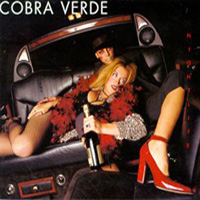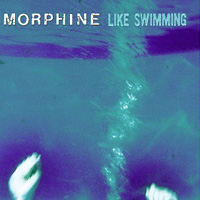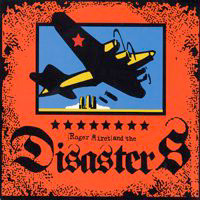 The Slackers
The Slackers
Redlight (Hellcat)
An interview with saxophonist David Hillyard
by Margo Tiffen
How’s the tour going?
It’s been a little rugged because we’re playing every day. I guess it started back on the 13th of October in D.C., and we’ve been gigging ever since. We’ve played Madison, Wisconsin, Chicago, St. Louis, Columbia, Missouri, Kansas, Colorado, Utah… It’s been cool, there’ve been people there who have been very receptive every time we’ve played. We’ve been taking Venice Shoreline Chris along as our opening act. He’s a one-man ska act.
Better Late Than Never was released through Moon Ska, why did you choose Hellcat for Redlight?
Moon is okay, they’ve done a lot of good things for people. They’ve put out a couple different albums that I’ve played on now, but the problem with Moon is that they don’t really have any budget to do any promotion. We never really felt like they were particularly interested in promoting us. It was nice to go to another label where we feel wanted.
How’d you hook up with Hellcat?
Me and Vic, our keyboardist, played with Rancid at Lollapalooza. Tim got to know us and through that, sort of the idea for Hellcat was germinating. We became one of the first bands they went for when they got it up and running. I’m psyched. I really like this album. It’s actually the first album I’ve ever played on that I enjoy listening to. Mostly, when you play something you’re just like, “Oh god, how could I have played that?” You regret the decisions you made at the time, and you’re like, “Oh man, I really suck.” This album, it’s not like I’m saying the saxophone parts are brilliant, but I really enjoy the sound of the band and I like the songs.
I saw you play with Rancid over the summer at the Tibetan Festival. Incidentally, we got the live CD from the festival and “The Harder They Come” is on it. What was it like playing the festival?
Oh, wow, that was just crazy. It was at a whole different level. I had done Lollapalooza so I was a little prepared, but even then it was overwhelming. There were a lot of acts I was psyched to see. I mean, Lee Perry was there. Lee Perry is probably one of the top four or five Slackers influences. I got to meet Taj Mahal, who is just really cool, really supportive of young musicians.
Have you ever had the chance to play with Lee Perry?
No, unfortunately. I’d like to. We actually had Glen Adams, who is the original keyboard player for Lee Perry and the Upsetters, produce a bunch of tracks on the album. He was very helpful, supportive. That’s the thing. A lot of the older Jamaican musicians are really very nice people. They’re very humble and they’re just about the music. They’re very supportive of younger people who want to listen to them and take the time to learn how to play their instruments.
 You had a lot of guest musicians on the album…
You had a lot of guest musicians on the album…
See, the cool thing about New York is there’s a big ska scene building up. A whole clique of musicians, like The Stubborn All Stars, which I play in, too, and so does Vic. There’s Skinnerbox and the Insteps. There’s a whole bunch of bands where we’re swapping musicians all the time. So it’s kind of natural that you would grab people for guests. Some of the guests like Larry McDonald, the percussionist, maybe a name that people don’t know, but they should. He’s been playing in groups since the ’60s. He’s an amazing guy to play with, he always gives you ideas. Clark Gayton, the trombone player… It’s kind of funny, ’cause he was the Skatalites trombone player prior to Will Clark, but he also plays with people like Sting and Prince. He’s really in demand, so we were really lucky to get him. We like to have family kind of albums. Get a whole bunch of people that we like, who we know, who we think can add something. Get a lot of different flavors, a lot of different styles on the album. Too often you can get separated from everyone else when you’re in a band, you get very like a little closed tribe and you don’t want to let anybody in. We try not to be like that.
Vic has talked a lot about how when the band started out, it was kind of a mess of different influences, like rocksteady, punk, dub… all of which you still have in some form. At some point, though, you decided to focus mainly on traditional ska…
I guess I’m partly responsible for that. They were a five-piece band without horns before I joined about four years ago. Then, it was sort of Two-Tone and they had some punk, but, see, even at that time, they were talking about rocksteady a lot. They just weren’t playing it. So, the last couple years we’ve just been going through the process of learning how to play rocksteady and reggae rhythms together. The punk stuff has never really gone away, it’s always been there and it’s always been an influence on the band, especially in the vocals and the songwriting.
What’s the songwriting process?
Vic’s the main songwriter. He’ll bring in ideas. Some pieces, like “Married Girl,” was a concept piece… Phil Spector was playing castanets, and all sorts of crazy stuff. Some other songs, like “Redlight,” are just jams we started, and built up from there. That was a real collaborative effort.
Do you enjoy instrumentals most?
Personally, being a saxophone player, you know. I think the jazz aspect of ska is important to keep alive. I always enjoy doing it. I really enjoy Vic’s voice, too, and Mark’s voice. I don’t mind laying back and letting them sing a lot.
What kind of music do you, personally, listen to the most?
I’ll just tell you how I got into playing saxophone. It was because of ska, really. I mean, I wanted to be the guy from the English Beat for the longest time. He was my first influence. Then I got into Tanya McCook and Lester Sterling and the Jamaican sort of sound. I sort of got into some of the session guys who were playing down there. They got me into jazz. I got really into a lot of the swing tenor players like Lester Young… Now I listen to everything from Dixieland to free jazz of the ’60s. I go to jazz jam sessions a lot in New York and hang out and learn from the older musicians. It’s like going to school.
New York’s a great place for that.
Boston’s not bad, either. We have some hometown Boston boys with us right now. Jeremy Mushlin lived in Randolph and Somerville. He played with Beat Soup and the Allstonians before moving down to New York. Mush, as he’s affectionately called. We have a guest trombone player on tour with us, Glen, who plays with the Pressure Cookers.
Obviously, ska’s getting pretty big these days. Have you noticed it at all, any changes in the shows…
When I was fifteen years old, we used to joke a lot about “what if everyone got into ska?” That was over ten years ago now. Then, all of a sudden, it happens. It’s actually not as cool as I thought it would be. I don’t think a lot of people take the music very seriously. To me, ska is like the blues. It’s a very deep music. I don’t feel a lot of the people treat it with the respect it deserves. They just say it’s happy, fast, good times music, when it has many different colors. I think a lot of people don’t really put the effort into ska that they should. “Well, I’m too good to play ska” is stuff I’ve heard from people. It used to be impossible to get people to play in ska bands when I first started one in the ’80s. Everyone thought, “Oh, I can play that, that’s easy.” In reality, they can’t. You can count on one hand the number of really, really good ska albums that were made in the United States.
What other ska bands do you think are in the same vein…
Well, I wouldn’t say the same vein, but people who I like a lot are Hepcat, you know, I used to play with them so I’m a little biased. I always love those guys. Jump With Joey, out of LA, I like them a lot, they were actually kind of an influence when I was a little bit younger. I like Skavoovie a lot. I like most of the New York bands. I’ve gotten to play with a lot of the people from Mephiskapheles, you know, Victor Rice, he’s played with everybody, really. That’s just some of the stuff that I like right now.
In one interview, Vic said one of the highlights of your lives was going to Japan; what made it so great?
I wasn’t on the tour, that was like the last hurrah of the five-piece Slackers. Basically, some rich Japanese people took a liking to the Slackers. They basically went on a rampage for a week in Japan. I think that’s the PG-rated version of the story.
Any good tour stories?
It’s just kind of disorienting because we were driving from Columbia, Missouri, straight to Denver, Colorado, straight to Utah, straight to Sacramento. Every day it’s a ten hour drive and you’re driving through a different climate every couple hours. Right now, I’m in California, which is, you know, in the seventies, and Columbia was, like, in the forties. In Denver, it was cold, but it was mountainous. Utah is just kind of a trip. It’s a very odd kind of place. Nevada was like a moonscape a lot of the time. I don’t know if I have any really good anecdotes yet, but we had some really cool shows. One of the coolest shows was Missouri, where we weren’t even announced. We just showed up. Our friends got us on the bill, and no one knew we were going to be there. There were like twenty five people, but they were really psyched that we were there. We played our asses off. That was my favorite gig of the tour.
Why was “Watch This” chosen for the Hellcat compilation?
“Watch This” is a weird song because we played it live and it stunk. It probably wasn’t even going to be on the album. For some reason, it got a vibe. It seems to have stuck out somehow, everyone keeps on mentioning it to me.
Anything else you want to say?
There’s going to be another tour. The NYC Ska Mob tour with Skinnerbox, the Slackers, and the Stubborn All Stars. We’re going to tour the East Coast and the Midwest, until around Dec. 20th. That should be a really fun revue tour. We’re going to do a lot of different kinds of material, a lot of different people’s songs. It’ll be like a showcase of all the music we’re doing right now.
Where are you calling from anyway?
A pay phone. I’m lost and scared in a Sacramento Mini Mall.



